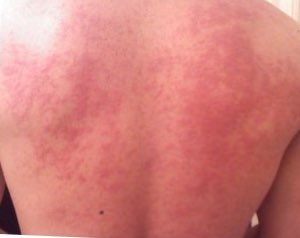Allergology
Allergology is the branch of medical science that studies the causes and treatment of allergies.
| System | Immune system |
|---|---|
| Significant diseases | Allergies, Asthma |
| Significant tests | Allergy testing, Spirometry |
| Specialist | Allergist/Immunologist |
Allergology is the medical specialty focused on the diagnosis, treatment, and prevention of allergic and related diseases.
Overview[edit | edit source]
Allergology, also known as allergy and clinical immunology, is dedicated to understanding the immune responses that result in allergic reactions and diseases. Allergists typically diagnose and treat conditions such as asthma, hay fever, food allergies, atopic dermatitis, and anaphylaxis. They are also skilled in recognizing and treating related immunological diseases.
History[edit | edit source]
The study of allergies began in the early 20th century. Clemens von Pirquet, in 1906, was the first to describe the concept of allergy, introducing the term to describe altered biological reactivity.
Evolution[edit | edit source]
Over the years, with advances in immunology, the field expanded to include a more in-depth understanding of the immune system's role in allergic diseases and led to the development of new diagnostic and therapeutic techniques.
Conditions Treated[edit | edit source]
- Asthma - A chronic condition that affects the airways in the lungs.
- Hay fever (Allergic Rhinitis) - An allergic response to outdoor or indoor allergens.
- Food allergies - An adverse reaction to the ingestion of specific foods.
- Atopic dermatitis (Eczema) - A chronic skin condition.
- Hives (Urticaria) - A skin reaction caused by allergens, stress, or other factors.
- Anaphylaxis - A severe, potentially life-threatening allergic reaction.
- And many more...
Diagnostic Methods[edit | edit source]
- Skin Tests - To identify allergens causing skin reactions.
- Blood Tests - To measure the amount of specific antibodies produced in response to allergens.
- Spirometry - To assess lung function and diagnose asthma.
- Challenge Tests - For food and medication allergies.
- Patch Tests - For contact dermatitis.
Treatments[edit | edit source]
- Avoidance - Refraining from exposure to allergens.
- Medication - Antihistamines, corticosteroids, decongestants, etc.
- Allergen Immunotherapy (Allergy Shots) - A long-term treatment that reduces sensitivity to allergens.
- Biologic Therapies - Target specific immune responses related to allergies.
Training and Certification[edit | edit source]
To become an allergist, a medical doctor (MD) or doctor of osteopathic medicine (DO) typically undergoes a three-year residency program after medical school, followed by two to three years of fellowship training specifically in allergology.
Professional Organizations[edit | edit source]
- The American Academy of Allergy, Asthma & Immunology (AAAAI)
- The European Academy of Allergy and Clinical Immunology (EAACI)
See also[edit | edit source]
| Allergology Resources | |
|---|---|
|
|
Search WikiMD
Ad.Tired of being Overweight? Try W8MD's physician weight loss program.
Semaglutide (Ozempic / Wegovy and Tirzepatide (Mounjaro / Zepbound) available.
Advertise on WikiMD
|
WikiMD's Wellness Encyclopedia |
| Let Food Be Thy Medicine Medicine Thy Food - Hippocrates |
Translate this page: - East Asian
中文,
日本,
한국어,
South Asian
हिन्दी,
தமிழ்,
తెలుగు,
Urdu,
ಕನ್ನಡ,
Southeast Asian
Indonesian,
Vietnamese,
Thai,
မြန်မာဘာသာ,
বাংলা
European
español,
Deutsch,
français,
Greek,
português do Brasil,
polski,
română,
русский,
Nederlands,
norsk,
svenska,
suomi,
Italian
Middle Eastern & African
عربى,
Turkish,
Persian,
Hebrew,
Afrikaans,
isiZulu,
Kiswahili,
Other
Bulgarian,
Hungarian,
Czech,
Swedish,
മലയാളം,
मराठी,
ਪੰਜਾਬੀ,
ગુજરાતી,
Portuguese,
Ukrainian
WikiMD is not a substitute for professional medical advice. See full disclaimer.
Credits:Most images are courtesy of Wikimedia commons, and templates Wikipedia, licensed under CC BY SA or similar.
Contributors: Prab R. Tumpati, MD





